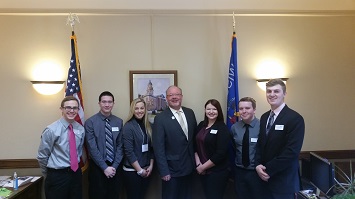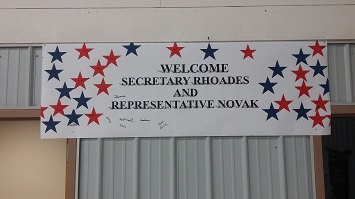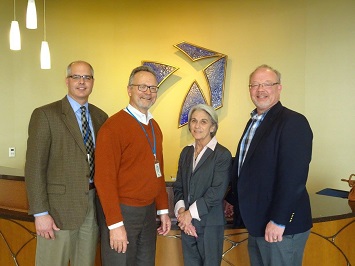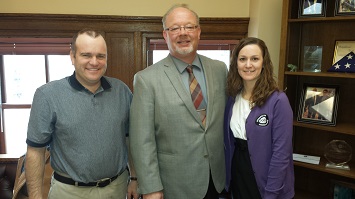Series
of Alzheimer's Bills Passed by State Assembly
I’m
honored to have been assigned to the Task Force on Alzheimer’s and
Dementia. I’m proud to have the opportunity to bring awareness to this
important issue. Alzheimer’s is the 6th leading cause of death in
America and the only one in the top ten that can’t be prevented, treated
or cured, according to the Alzheimer’s Association. Our goals, included
identifying ways to improve and sustain in-home care, improving and
promoting community-based resources for those suffering with Alzheimer's
and Dementia, continue raising individual and community awareness of
these diseases, and determining ways to ensure future quality of care
while lowing the cost of long-term care.
Through
public hearings, listening to experts, caregivers, state officials and
community members, we compiled enough information and ideas to guide our
legislation. These diseases impact the citizens of Wisconsin every day,
affecting friends, and family.
Last week,
the State Assembly passed a series of bills that improve the care of
those suffering from these diseases by providing community-based
resources and education. these bills are, meaningful progress in
addressing the awareness and symptoms of these diseases and providing
resources for individuals, families, and friends who are impacted. Below
is a summary of the legislation:
AB 783,
relating to: funding for a virtual dementia tour license and making an
appropriation.
• Directs the Department of Health Services to purchase Virtual Dementia
Tour Licenses to be utilized at Aging and Disability Resources Centers
throughout Wisconsin.
• The Virtual Dementia Tour is used to raise awareness of Alzheimer’s
and dementia and to help people understand these diseases.
• It is often employed by Dementia Care Specialists in their local
communities.
• Appropriates $50,000 one-time to DHS for the purchase of licenses.
AB 784,
relating to: funding for the Alzheimer’s Disease Research Center at the
University of Wisconsin−Madison and making an appropriation.
• The funding would be for 2 studies, the new studies include plans to
analyze blood samples from adult, middle-aged children of patients with
Alzheimer’s. These adult children are at an increased risk of developing
the disease and analysis of their blood samples may allow them to
identify new abnormal proteins that could cause Alzheimer’s. Discovery
of such novel proteins could attract large grants from NIH (National
Institutes of Health) and other federal agencies, and lead to new
potential treatments and prevention approaches for Alzheimer’s.
• The bill provides an ongoing appropriation of $50,000 to support the
Alzheimer’s Disease Research Center at the University of Wisconsin –
Madison.
AB 785,
relating to: dementia specialist certification program.
• Creates a dementia specialist certification.
• No person may use the title "dementia specialist" or "certified
dementia specialist"
without the certification.
• If a person provides evidence of successful completion of an approved
instructional program and pays a certification fee, the Department of
Health Services must certify that person as a dementia specialist. The
certification is valid for two years and can be renewed if the
individual provides proof to DHS of four hours of continuing education.
AB 786,
relating to: report on dementia crisis unit pilot program and placement
of individuals with dementia.
• Requires DHS to propose a pilot program for two or more counties to
create dementia crisis units.
• These dementia crisis units would be an option for individuals with
Alzheimer’s and dementia who are in a crisis situation.
• The department shall submit the report to the appropriate standing
committee of the legislature with jurisdiction over health, aging and
long-term care, or mental health issues.
AB 787,
relating to: funding for respite care under the Alzheimer’s Family and
Caregiver Support Program and making an appropriation.
• Provides a $1 million increase for respite care under the Alzheimer’s
Family and Caregiver Support Program (AFCSP) for fiscal year 2016-17.
• AFCSP was formed as part of the 1985-87 annual budget and is currently
allocated $1.5 million in calendar year 2015.
• Allows tribes to participate in the AFCSP. Since the inception of the
program, tribes have not been able to utilize the AFCSP.
• Currently, an individual or there family member must have an annual
income of no more than $40,000 to participate in the AFCSP. As amended,
an individual or there family member must have an annual income of no
more $48,000, which is 300% of the federal poverty line.
AB 788
(Bill I authored),
relating to: funding for dementia care specialists in aging and
disability resource centers and making an appropriation.
• Increases funding to DHS for the fiscal year 2016-17 to put additional
money into base funding to authorize the hiring of four additional
Dementia Care Specialists (DCSs) by ADRCs in counties with a population
under 150,000.
• This bill also increases funding to DHS to fill one additional FTE
position for the training of Dementia Care Specialists in ADRCs to
educate employers about issues relating to dementia with their employees
and family members of employees. The bill funds this position through an
increase of $93,000 GPR. After one year, DHS must submit a report to JFC
including a summary of the position, training activities performed, and
dementia-related employer education activities conducted by the
position.
AB 789,
relating to: continuing legal and judicial education on elder
law−related issues.
• Requests the Wisconsin Supreme Court to promulgate rules requiring
attorneys who practice elder law or trusts and estates law to complete
certain continuing legal education requirements. Requires the court to
do the same for justices relating to elder law and trusts and estates
law.
• This legislation looks to strengthen the system we already have in
place to protect those living with Alzheimer’s and dementia from fraud
and financial abuse.
• The supreme court is requested to promulgate rules that require each
attorney to complete, each reporting period, at least one continuing
legal education credit but no more than 2 continuing legal education
credits relating to identification of financial exploitation and
isolation of vulnerable adults and ethical representation of older
adults, including methodology and standards for reasonable diligence in
pursuing a client's best interest, as determined by the board of bar
examiners.
AB 790,
relating to: dementia training grants for mobile crisis teams and making
an appropriation.
• Requires the Department of Health Services to award grants to counties
or regions of counties for their mobile crisis teams to obtain training
on recognizing and serving individuals with dementia.
• Under current law, the state provides grants to mobile crisis teams to
help provide assistance in cases of individuals suffering from acute
mental illness. These teams respond in situations where an individual’s
mental or emotional condition leads to behavior which makes them a
danger to themselves or others. Grants are currently distributed to
counties which apply for them.
• It is increasingly necessary for these teams to be trained to respond
to individuals with Alzheimer’s and dementia. As Wisconsin’s population
ages, mobile crisis teams are more often being called to an emergency
involving a person with dementia.
AB 791,
relating to: informed consent for psychotropic medications in nursing
homes and community−based residential facilities.
• Requires a community−based residential facility to obtain a signed
acknowledgment form for administration of psychotropic medications to
residents with Alzheimer’s or other dementia. Psychotropic medications
have Black Box Warnings for individuals with a degenerative brain
disorder, such as Alzheimer’s and dementia because they increase
mortality. Black Box Warnings are assigned by the U.S. Food and Drug
Administration and are intended as warnings for the administration of
certain drugs.
• Creates requirements for obtaining a signed acknowledgment form, for
residents who are prescribed medications while off the premises of a
community−based residential facility.
• Current law already requires that nursing homes obtain written
informed consent before administering a psychotropic medication that
contains a boxed warning to any patient with a degenerative brain
disorder.
AB 792,
relating to: referrals for subjects of alerts for missing adults and
operator’s license review.
• Requires a law enforcement agency that has issued a Silver Alert to
refer the person making the report to a local ADRC.
• Also requires DOT to review the driver’s license of the person who is
the subject of a Silver Alert to determine if restrictions should be
placed on a person’s license for the safety of them and others.
Wisconsin Newspaper Association
Legislative Service Award
This week I
received the Wisconsin Newspaper Association’s (WNA) Legislative Service
award. The award was given in appreciation of the time and effort, and work
done on behalf of the welfare of the newspapers of Wisconsin.
The WNA presented the award as a thanks for supporting the newspaper
industry, specifically the leadership demonstrated that led to the repeal of
the Newspaper Recycling Fee earlier this session. Additionally, they
applauded, and thanked me for the work done on the pending clarification in
the Worker’s Compensation Act, that will help avoid potential financial
consequences that could be devastating for the industry if it were to remain
unchanged.
Having worked in the newspaper business for 25 years, the award is very
special to receive and a great ending to my lengthy newspaper career. It’s
an honor to be recognized by an industry that I know, understand, and will
continue to be a friend.
The award was presented by Pat Reilly, the Publisher of The Dodgeville
Chronicle and WNA board member.

What's Been Happening
Recently, I've
had the pleasure of attending some local events, in addition to meeting with
people at the Capitol in Madison.
Last week, I
had the opportunity to meet with Zach Sherman, Austin Erdenberger, Taylor
Alt, April Brandt, Brett Hederman, and Jared Bollinger, a group of students
from Southwest Tech this week. Thank you guys for stopping by, I hope you
enjoyed your visit to Madison!
On Monday, I
was in Monroe with Kitty Rhoades, Secretary of the Wisconsin Department of
Health Services. We took tours of GreenCo Industries, and Monroe Clinic.
We toured and met with staff at both facilities, and had were shown the LEAN
process improvement practices in place at the Monroe Clinic. Additionally,
we discussed the residency program they've established and how it is making
a difference in training Doctors pursuing a career in rural medicine.
It's always a pleasure to get out in the community to tour local businesses,
meet with staff, and discuss what's important to them.
I was glad to
have also met with the Wisconsin Pork Association this week. Two of
their board members, Mandy Masters, and Nathan Brickl, came to the Capitol
to sit down and discuss issues and policy important to them.
 |
 |
| Zach
Sherman, Austin Erdenberger, Taylor Alt, April Brandt, Brett
Hederman, and Jared Bollinger, a group of students from Southwest
Tech this week. |
Tour
and staff meet and greet with DHS Secretary Kitty Rhoades, and
GreenCo CEO Jean Zweifel. |
 |
 |
| Dr.
Mark Thompson, Monroe Cinic Chief Medical Officer, Mike Sanders
Monroe Clinic CEO, Kitty Rhoades Secretary of DHS, Representative
Todd Novak. |
Wisconsin Pork Association. (L to R) Nathan Brickl, Rep. Novak, &
Mandy Masters. |
| |
Sincerely,
 |

